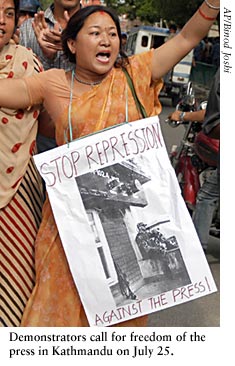New York, August 1, 2005—The Committee to Protect Journalists condemns the harassment and intimidation of three journalists by security forces in Nepal’s mid-western Dailekh district in retaliation for their reports alleging that the Royal Nepalese Army is recruiting children to work as informants.
Harihar Singh Rathour, a reporter for Kantipur daily and Kathmandu Post; Pushkar Thapa, a reporter for the daily Annapurna Post; and Kamal Neupane, a reporter for Nepal Samacharpatra followed instructions this morning to report to Major Hikmat Bista at the army barracks of the Bhawani Baks battalion, according to the Federation of Nepalese Journalists (FNJ) and the local human rights group INSEC. A fourth person, INSEC representative Naman Kumar Shahi, was also summoned.
FNJ reported in a statement that the major asked the journalists and the human rights worker to issue corrections to their reports that the army was training children to participate in its fight against Maoist rebels. They refused to issue corrections and maintained that their reports were accurate.
Today’s harassment follows several related incidents in the days since the newspapers first carried their reports.
The chief of the Bhawani Baks battalion wrote a letter to Rathour last Tuesday, calling his July 20 Kathmandu Post report, “RNA using Dullu kids as informants,” misleading and summoning the journalist to the army barracks to provide clarification, according to INSEC. On Thursday, the journalist reported to the barracks and submitted a written statement testifying to the article’s accuracy, according to local news reports.
The following day, security forces took Neupane, Thapa, and Shahi to the local army barracks and interrogated them about their own reports on the allegations, according to INSEC.
Yesterday, security forces took Neupane and Shahi to the army barracks, where they were directed to provide fingerprints, according to local and international news reports. Security personnel threatened the two men by hinting that the army could label them Maoists, according to news reports and FNJ sources.
“Journalists’ right to report on the conflict between rebels and the government is crucial for maintaining transparency and accountability,” CPJ Executive Director Ann Cooper said. “We call on authorities to stop harassing journalists and allow them to fulfill this important duty.”
After King Gyanendra imposed a state of emergency on February 1, the government banned journalists from reporting on the conflict without official vetting. Rebels have been fighting since 1996 to topple the monarchy, and journalists face threats from both sides of the conflict; they are frequently abducted by Maoists and detained by security forces.
In a separate incident on Saturday, security forces detained overnight Ramakant Gautum, a distributor for Kantipur in Pokhara, 200 kilometers (124 miles) west of Kathmandu, according to the newspaper’s online edition. Gautum, who was released on Sunday, told Kantipur that he was beaten by security forces even after he told them that he was a newspaper distributor. Security forces also searched the room of Kantipur’s Pokhara correspondent on Saturday night, according to the newspaper.
![]()
